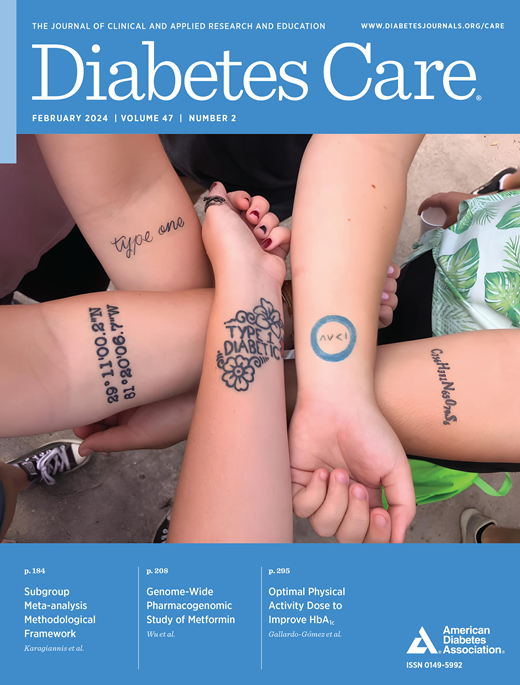M120 Risk Score Improves Identification of Children at High Risk of Developing Clinical Type 1 Diabetes and Reports Short-Term Response to Preventive Immunotherapy
IF 16.6
1区 医学
Q1 ENDOCRINOLOGY & METABOLISM
引用次数: 0
Abstract
OBJECTIVE Approval of teplizumab as disease-modifying therapy for type 1 diabetes heralds a new therapeutic era. To facilitate prevention trials, we determined if the M120 risk score could enrich for type 1 diabetes risk and define early treatment effects. RESEARCH DESIGN AND METHODS M120, based on age, sex, BMI, IA-2 antibody status, HbA1c, blood glucose, and C-peptide 120 min after oral glucose, was determined in TrialNet participants with multiple islet autoantibodies and those who joined the teplizumab prevention trial. RESULTS Compared with the oral glucose tolerance test, M120 identified 26% more children at high risk of progression. When applied to data from the teplizumab trial, M120 improved after teplizumab (P = 0.0362) and deteriorated after placebo (P = 0.0489) to reveal a significant treatment effect after 6 months (P < 0.001). CONCLUSIONS M120 improves risk stratification and identifies early effects of immunotherapy. It could be applied to increase prevention trial efficiency and guide treatment decisions in the clinic.M120风险评分提高了临床1型糖尿病高危儿童的识别,并报告了对预防性免疫治疗的短期反应
目的 特普利珠单抗被批准作为 1 型糖尿病的疾病调整疗法,预示着一个新的治疗时代的到来。为了促进预防试验,我们确定了 M120 风险评分是否能丰富 1 型糖尿病风险并确定早期治疗效果。研究设计和方法 根据年龄、性别、体重指数、IA-2 抗体状态、HbA1c、血糖和口服葡萄糖后 120 分钟的 C 肽,在具有多种胰岛自身抗体的 TrialNet 参与者和加入替普利珠单抗预防试验的参与者中确定 M120。结果 与口服葡萄糖耐量试验相比,M120 发现的病情恶化高风险儿童增加了 26%。当应用于替普利珠单抗试验数据时,M120在替普利珠单抗治疗后有所改善(P = 0.0362),在安慰剂治疗后有所恶化(P = 0.0489),6个月后显示出显著的治疗效果(P < 0.001)。结论 M120 可改善风险分层并识别免疫疗法的早期效果。它可用于提高预防试验的效率并指导临床治疗决策。
本文章由计算机程序翻译,如有差异,请以英文原文为准。
求助全文
约1分钟内获得全文
求助全文
来源期刊

Diabetes Care
医学-内分泌学与代谢
CiteScore
27.80
自引率
4.90%
发文量
449
审稿时长
1 months
期刊介绍:
The journal's overarching mission can be captured by the simple word "Care," reflecting its commitment to enhancing patient well-being. Diabetes Care aims to support better patient care by addressing the comprehensive needs of healthcare professionals dedicated to managing diabetes.
Diabetes Care serves as a valuable resource for healthcare practitioners, aiming to advance knowledge, foster research, and improve diabetes management. The journal publishes original research across various categories, including Clinical Care, Education, Nutrition, Psychosocial Research, Epidemiology, Health Services Research, Emerging Treatments and Technologies, Pathophysiology, Complications, and Cardiovascular and Metabolic Risk. Additionally, Diabetes Care features ADA statements, consensus reports, review articles, letters to the editor, and health/medical news, appealing to a diverse audience of physicians, researchers, psychologists, educators, and other healthcare professionals.
 求助内容:
求助内容: 应助结果提醒方式:
应助结果提醒方式:


